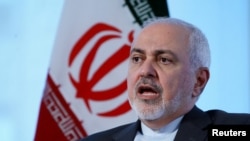Iran's Foreign Minister Mohammad Javad Zarif arrived in neighboring Pakistan late Thursday for bilateral consultations amid Tehran's escalating tensions with the United States.
Officials in Islamabad said Zarif would begin his official engagements on Friday. He will brief Pakistani civilian and military leaders on current regional developments, Iranian state media said.
Tensions between Tehran and Washington have been escalating since U.S. President Donald Trump announced his decision to try to cut Iran's oil exports to zero and beef up the American military presence in the Persian Gulf in response to what he said were Iranian threats.
Pakistan already has stated it will not take sides in the confrontation and described the crisis in the Persian Gulf region as "disturbing." Islamabad says, however, Washington's decision to deploy an aircraft carrier and bombers has fueled tensions and "the existing precarious security situation" in the Middle East.
Support for dialogue
"We expect all sides to show restraint, as any miscalculated move can transmute into a large-scale conflict," Foreign Ministry spokesman Mohammad Faisal told a weekly news conference hours before the Iranian foreign minister landed in Islamabad.
"Pakistan always supports dialogue and desires that all issues should be settled peacefully and through engagement by all sides," Faisal stressed.
Border security issues are also expected to be discussed during Zarif's visit.
Pakistan and Iran share a border of more than 900 kilometers. Iranian officials regularly allege anti-state Sunni militants use hideouts on the Pakistani side to orchestrate terrorist attacks inside Iran.
For its part, Islamabad says separatist groups active in its volatile Baluchistan province use sanctuaries on the Iranian side to plan cross-border terrorist attacks.
Pakistani Prime Minister Imran Khan last month made his first official visit to Tehran and spoke extensively with President Hassan Rouhani on strengthening bilateral security, economic and trade ties.
Rouhani noted that Khan's visit would be "a turning point" in improving bilateral relations.





